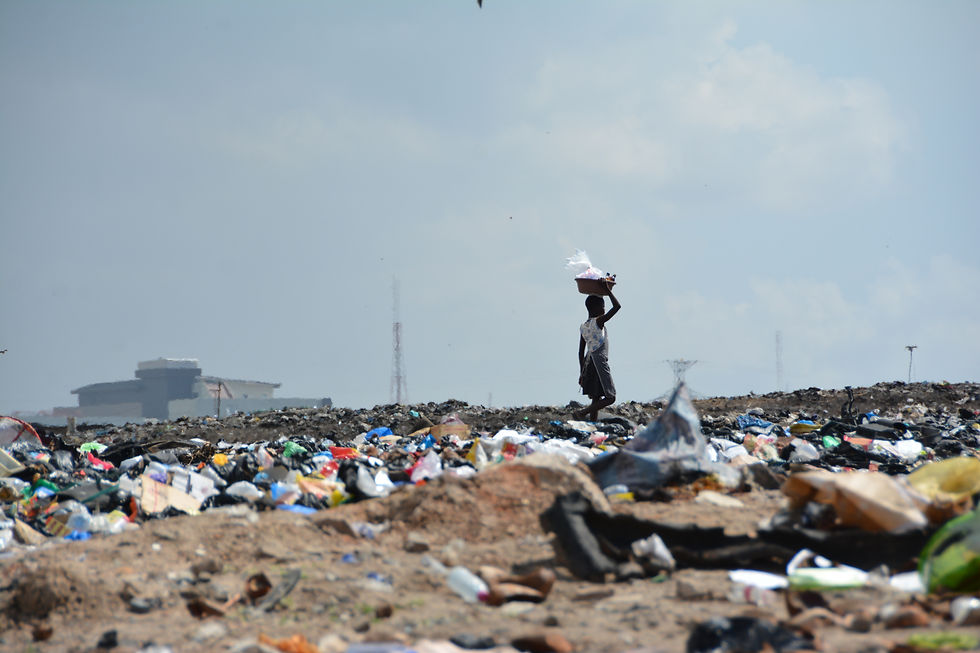The Importance of Waste Management in East Africa
- Nicera Wanjiru Kimani
- Aug 17, 2023
- 3 min read
Updated: Aug 27, 2023
Trash is a by-product of (mostly) human activities. Solid waste from households, institutions, businesses and industries pose a menace when it comes to both disposal and management, affecting both well-developed, and not so well-off communities. Affluent neighbourhoods have working systems that ensure the waste generated is responsibly disposed of, whereas informal settlements (ghettos) suffer from public trash dumping in rivers, outside buildings, on roads, railway lines etc.

Waste management is a topic that attracts the attention of both policy makers and those tackling waste. Poor waste management has adverse effects on the environment, such as blocking drainage systems, which in turn leads to flooding especially in urban settlements; degradation of beautiful places as waste is dumped in landfills, and the mountains of trash become havens for criminals and criminal activities.
Some waste eventually finds its way into lakes and the ocean, where it compromises the quality of life of aquatic organisms. Effects of poor waste management are felt both immediately and much later. For example, suffocation of aquatic organisms due to plastic waste finding its way into oceans may be an immediate effect, while methane emissions from landfill sites could be something that is experienced gradually.
Numerous studies have been carried out on waste management, how trash impacts the environment, household solid waste management, among others. Despite the severity of the problem, there are few opportunities for funding of these studies. Locally, a few studies on the topic have been done. Most of them being conducted purely for academic purposes.

According to Omar Kazungu, a youth working in a community initiative in Likoni, there are few studies in rural areas. Community Mappers, a local community-based organisation in Nairobi, conducts research on data that can inform interventions. In 2021, they conducted a trash study with Idea Maps and the University of Twente; Community Mappers set out to find the distribution of trash in four informal settlements in Nairobi (Kibera, Mathare, Kariobangi and Majengo). The study mapped trash according to volume/size, contents, fresh trash, and evidence of burning and presence of odour. The study incorporated use of satellite data to show the distribution of the trash. Volume of trash was split according to what could fill a sack, a cart, or a truck.
According to Mr. Oliver Okemo, an environment officer in Nairobi, “East Africa has experienced an increase in waste generation which can be attributed to population growth, rapid urbanisation, increased industrialisation in the region and a shift in consumption habits. Currently, even food is highly processed and packaged in non bio-degradable packaging like plastic, which finds its way into our environment.” On policies, he confirms that, “East African countries (Kenya, Uganda, Tanzania and Rwanda) signed a joint strategy to put in place infrastructure regarding waste management and regulation. Also, they have signed several international conventions related to waste treatment e.g. the Basel Convention in 1992, which prohibits trans-boundary movements of waste classified as hazardous to the environment.” He affirmed that, “A lot is happening, and yes, it is inspired by data collected in studies on waste management.“

The importance of studies on waste management is undeniable. As a Swahili proverb states ‘usilolijua ni usiku wa giza’ (what you do not know is a dark night), and indeed working without the guidance of data is akin to stumbling and fumbling in the dark. Different sectors are slowly shifting their mindset on studies. Attitudes are also being transformed. For example, policies are shifting from criminalising solid waste action or inaction to promoting good practice. One of these practices is conducting studies and using the data collected to inform follow-up action.
About the Author
Nicera Wanjiru Kimani is a content creator and writer at Vice Versa Global and National Federation Leader SDI Kenya, as well as a community organiser, mobiliser and trainer who has extensive experience in project management, having worked in the world of development for close to a decade.

nice blog